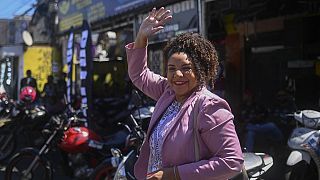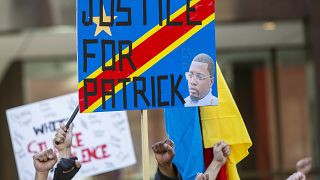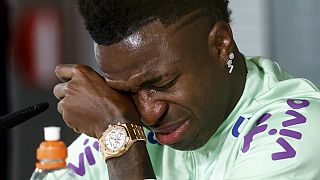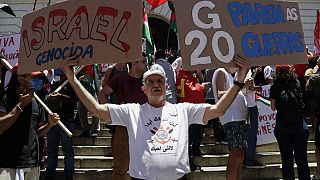Brazil
On Saturday, protests took to the streets of Rio de Janeiro, Sao Paulo and other Brazilian cities protesting the murder of Congolese refugee Moïse Mugenyi Kabagambe who died on on Jan. 24.
Demonstrators gathered on Saturday in Rio de Janeiro, Sao Paulo and other Brazilian cities to protest the killing of a 24-year-old Congolese refugee who was beaten to death on Jan. 24, and which sparked outrage and revulsion across the nation.
In Rio, they gathered outside the same beach kiosk where Moïse Mugenyi Kabagambe had recently been working in Barra da Tijuca, a neighborhood known for its upmarket condominiums and shopping malls.
The two lanes in front of the kiosk were covered with banners featuring images and photos of Moïse. One sign, held by more than 10 people, beside an image of the dead young man’s face, said “Justice for Moïse. Stop killing us!”
“Moïse was beaten for 15 minutes, on a busy beach, where people pass by all the time, and at no time did anyone call the police and try to separate them,” said attorney Rodrigo Mondengo, of Brazil’s Bar Association in Rio. “We have no doubt that if it were a white person there being beaten, someone would go to that person’s rescue.”
Horrendous crime
Kabagambe's assailants were caught on security camera footage the police have released to the media. It shows three men violently attacking the young man, and over the course of 13 minutes holding him down, beating him with a rod—, and continuing to do so even after he loses consciousness. They are later seen attempting chest compressions, then rolling his body over.
Police are still investigating the circumstances that prompted Kabagambe’s killing. Many felt no need to await official findings in a city where murder often goes unpunished; they asserted Kabagambe’s death was evidence of racism, xenophobia and impunity.
Human Rights Watch denounced a “deplorable” crime in a Feb. 1 statement. “COWARDICE. SAVAGERY. BARBARITY,” blared the front page of local newspaper Extra’s Feb. 2 front page, along with images of the assault.
Kabagambe moved to Brazil in 2011 from his native Bunia, capital of Congo’s northeastern Ituri province, in 2011, his cousin Yannick Kamanda confirmed to AP. The country’s east has been mired in conflict for decades, and local media reports said the family had fled fighting between the Hema and Lendu ethnic groups.
“Moïse’s mother fled with her children from Congo to Brazil fearing they would die the same way as her mother, or disappear the same way as Moïse’s father,” said Rio state lawmaker Dani Monteiro, who heads the state legislature's human rights commission and met with the family.













Go to video
SADC extends mandate of its troops in DRC and Mozambique
01:22
Cases of new mpox strain more than double among children in DR Congo and Burundi
02:09
DRC on a mission to financing the world's largest hydropower dam
01:15
WHO: Mpox cases in South Kivu may be 'plateauing', but DRC seeing a 'general rising trend' in cases
01:05
US probes racist text messages referencing slavery sent to Black men, women
02:10
Mixed reactions to Trump victory among residents in the Democratic Republic of Congo